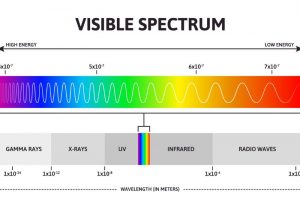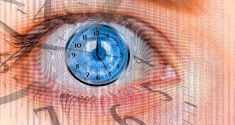As blue light exposure has increased with the rise in use of LED lighting and electronic devices such as mobile phones, tablets and computers, so too have concerns about the potential health impacts of this specific type of light. Studies indicate that blue light exposure can impact melatonin production and sleep timing, affecting the circadian rhythm. Circadian rhythm disruption is associated with a wide range of health issues. There are also questions about the impact of blue light on eye health. These concerns have led to efforts to reduce blue light exposure. Blue light glasses have become a popular option. But, as many ask, do blue light glasses work?
Short-Wave, High Energy Blue Light

We have daily exposure to blue light when we are outside during the day. In fact, that is the most powerful exposure we typically receive. And it is important exposure, helping to maintain a healthy circadian rhythm, promoting better sleep quality and offering a number of cognitive and mental health benefits. For most of human history, this daily natural light exposure was our primary experience of blue light. However, that is not the case today.
Energy efficient artificial lighting, such as LED lighting, and a variety of electronic devices, including mobile phones, tablets and computers, add to our blue light exposure. Use of these devices across age groups for work, school and pleasure has increased significantly over the past two decades. That increase was particularly notable during the COVID-19 pandemic, both in leisure use and in working or learning from home.
Blue Light Related Health Concerns
While natural light exposure does offer important benefits, there are health concerns associated with blue light exposure. When it comes to circadian rhythm health and sleep quality, the timing of blue light exposure matters. With natural light, the exposure wanes with the setting sun and as darkness falls, melatonin production is set in motion, preparing the body for sleep. However, evening blue light exposure can suppress melatonin production. That, in turn, can delay sleep timing and disrupt the circadian rhythm. Chronic disruptions in the circadian rhythm and sleep quality are linked to higher risks of numerous diseases and chronic health conditions, including type two diabetes, obesity, cardiovascular diseases and certain types of cancers.
Some health care professionals have also expressed concern about eye health in relation to blue light exposure. According to some researchers, long time blue light exposure can increase the risk of developing cataracts, macular degeneration and can make nearsightedness worse. Not all eye health specialists agree, with some pointing out that the blue light emitted by electronic devices is not nearly as strong as that emitted by the sun.
Some ophthalmologists suggest that some of the eye related symptoms some people associate with blue light exposure via screens, such as headache, difficulty concentrating, dry eyes, watery eyes, vision blurring and sensitivity to light, may actually be digital eye strain or computer vision syndrome, a result of staring at a screen for long periods of time with reduced blinking. Further research is ongoing.
Do Blue Light Glasses Work?

If eye symptoms are related to digital eye strain rather than blue light, then blue light glasses may not be the answer. However, if your goal in using blue light glasses is more about protecting your melatonin production schedule, circadian rhythm and sleep quality, if used at the right times, the glasses may be useful. The general consensus seems to be that blue light glasses are not harmful, but more research needs to be done to confirm benefits.
Other Ways to Reduce Blue Light Exposure
There are some evidence-based ways to reduce blue light exposure during the evening when it can disrupt melatonin production and sleep timing, thereby impacting the circadian rhythm. Make use of your blue light filter on your devices when the sun goes down. Consider using light bulbs with reduced blue light. Use red light bulbs at night. Don’t use electronic devices within two to three hours of bedtime. Try to break the habit of using devices with screens – mobile phones, tablets, computers and televisions – as an evening leisure activity.







